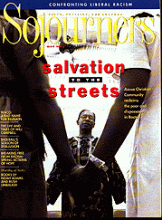It was so sad, yet so unsurprising.
Several members of the Azusa Christian Community in Boston had gathered on the corner of School and Washington Streets to pray for Robert Smith, better known as "Man," who was shot a few nights before on that same corner. While we were gathering to pray, a fight broke out up the street. Two women were determined to break a bottle over the head of a man and maybe the woman he was with, too. Several of our group ran over to intervene. The police were called. They arrived after the fighters had already left.
No one in the group knew why those women and the man were fighting, cursing, screaming, and willing to tear off their clothes in the freezing weather and snow. That kind of rage and anger -- the kind that disappears as quickly as it erupts -- is dangerous. It requires a healing that secular institutions and good works alone cannot offer.
So our little group prayed. We prayed for "Man," for the spiritual salvation of the people fighting, and for the collective soul of our black community.
The Azusa Christian Community is an intentional community of black men, women, and children who are committed to the complete renewal -- spiritually, culturally, intellectually, and politically -- of the black poor people in inner-city Boston. The members of Azusa -- most of whom were educated at Harvard University, the Massachusetts Institute of Technology (MIT), and other elite academic institutions -- choose to live among the black poor in the Four Corners and Codman Square neighborhoods in North Dorchester. While holding down full-time jobs to support themselves and their families, or while struggling through graduate school, the members of Azusa still find time to act as surrogate parents for an ever-expanding army of angry, emotionally unstable young black people.
Read the Full Article

